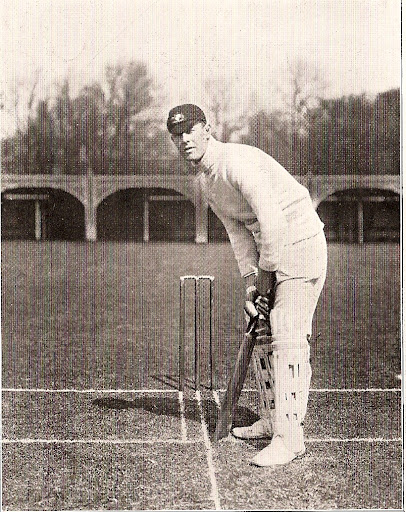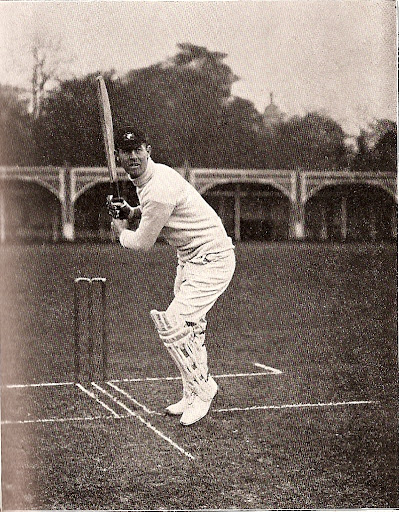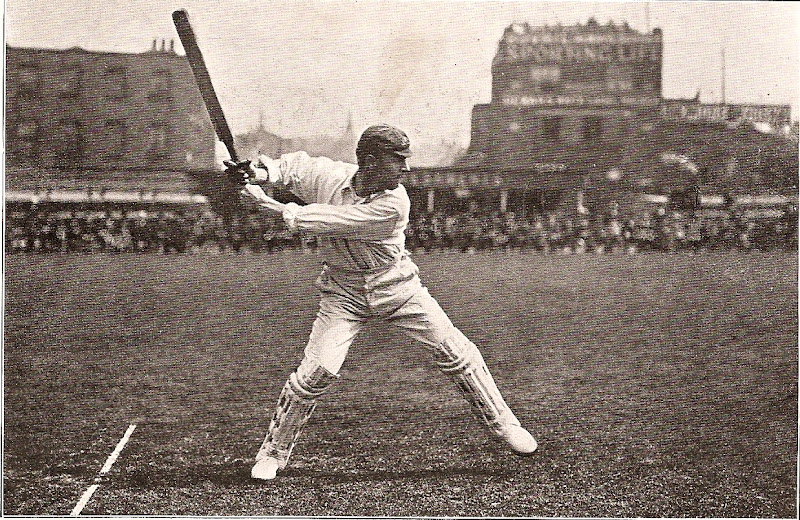It is difficult to realize that a relatively minor event in one's life can still remain the most important through the years. I was chosen to play for Redfern against Paddington - and Paddington was Victor Trumper's club. This was unbelievable, fantastic. It could never happen - something was sure to go wrong. A war - an earthquake - Trumper might fall sick. A million things could crop up in the two or three days before the match.
I sat on my bed and looked at Trumper's picture still pinned on the canvas wall. It seemed to be breathing with the movement of the draught between the skirting. I glanced at his bat standing in a corner of the room, then back at the gently moving picture. I just couldn't believe that this, to me, ethereal and godlike figure could step off the wall, pick up that bat and say quietly, 'Two legs, please, umpire', in my presence.
My family, usually undemonstrative and self-possessed, found it difficult to maintain that reserve which, strange as it may seem, was characteristic of my father's Northern Irish heritage.
'H'm,' said Father, 'Playing against Trumper on Saturday. By jove, you'll cop Old Harry if you're put on to bowl at him.'
'Why should he?' protested Mother. 'You never know what you can do till you try.'
I had nothing to say. I was little concerned with what should happen to me in the match. What worried me was that something would happen to Trumper which would prevent his playing.
Although at this time I had never seen Trumper play, on occasions I trudged from Waterloo across the Sandhills to the Sydney cricket ground and waited at the gate to watch the players coming out. Once I had climbed on a tram and actually sat opposite my hero for three stops. I would have gone further but having no money I did not want to take the chance of being kicked in the pants by the conductor. Even so I had been taken half a mile out of my way.
In my wildest dreams I never thought I would ever speak to Trumper let alone play against him. I am fairly phlegmatic by nature but between the period of my selection and the match I must have behaved like a half-wit.
Right up to my first Test match I always washed and pressed my own flannels, but before this match I pressed them not once but several times. On the Saturday I was up with the sparrows and looking anxiously at the sky. It was a lovely morning but it still might rain. Come to that, lots of things could happen in ten hours - there was still a chance that Vic could be taken ill or knocked down by a tram or twist his ankle or break his arm....
My thoughts were interrupted by a vigorous thumping on the back gate. I looked out of the washhouse-bathroom- woodshed-workshop window and saw that it was the milkman who was kicking up the row.
'Hey !' he roared - 'yer didn't leave the can out. I can't wait around here all day. A man should pour it in the garbage tin - that'd make yer wake up a bit!'
On that morning I wouldn't have cared whether he poured the milk in the garbage tin or all over me. I didn't belong to this world. I was playing against the great Victor Trumper. Let the milk take care of itself. I kept looking at the clock. It might be slow - or it might have stopped! I'd better whip down to the Zetland Hotel and check up. Anyhow, I mightn't bowl at Trumper after all. He might get out before I come on. Or I mightn't get a bowl at all- after all, I can't put myself on. Wonder what Trumper's doing this very minute ... bet he's not ironing his flannels. Sends them to the laundry, I suppose. He's probably got two sets of flannels, anyway. Perhaps he's at breakfast, perhaps he's eating bacon and eggs. Wonder if he knows I'm playing against him? Don't suppose he's ever heard of me. Wouldn't worry him anyhow, I shouldn't think. Gosh, what a long morning! Think I'll dig the garden. No, I won't - I want to keep fresh. Think I'll lie down for a bit . . . better not, I might fall off to sleep and be late.
The morning did not pass in this way. Time just stopped. I couldn't bring myself to doing anything in particular and yet I couldn't settle to the thought of not doing anything. I was bowling to Trumper and I was not bowling to Trumper. I was I early and I was late. In fact, I think I was slightly out of my mind.
I didn't get to the ground so very early after all, mainly because it would have been impossible for me to wait around so near the scene of Trumper's appearance - and yet for it to - rain or news to come that something had prevented Vic from playing.
'Is he here?' I asked Harry Goddard, our captain, the moment I did arrive at the ground.
'Is who here?' he countered.
My answer was probably a scornful and disgusted look. I remember that it occurred to me to say, 'Julius Caesar, of course' but that I stopped myself being cheeky because this was one occasion when I couldn't afford to be.
Paddington won the toss and took first knock.
When Trumper walked out to bat, Harry Goddard said to me: 'I'd better keep you away from Vic. If he starts on you he'll probably knock you out of grade cricket.'
I was inclined to agree with him yet at the same time I didn't fear punishment from the master batsman. All I wanted to do was just to bowl at him. I suppose in their time other ambitious youngsters have wanted to play on the same stage with Henry Irving, or sing with Caruso or Melba, to fight with Napoleon or sail the seas with Columbus. It wasn't conquest I desired. I simply wanted to meet my hero on common ground.
Vic, beautifully clad in creamy, loose-fitting but well- tailored flannels, left the pavilion with his bat tucked under his left arm and in the act of donning his gloves. Although slightly pigeon-toed in the left foot he had a springy athletic walk and a tendency to shrug his shoulders every few minutes, a habit I understand he developed through trying to loosen his shirt off his shoulders when it became soaked with sweat during his innings.
Arriving at the wicket, he bent his bat handle almost to a right angle, walked up the pitch, prodded about six yards of it, returned to the batting crease and asked the umpire for 'two legs', took a guick glance in the direction of fine leg, shrugged his shoulders again and took up his stance. I was called to bowl sooner than I had expected. I suspect now that Harry Goddard changed his mind and decided to put me out of my misery early in the piece.
Did I ever bowl that first ball? I don't remember. My head was in a whirl, I really think I fainted and the secret of the mythical first ball has been kept over all these years to save me embarrassment. If the ball was sent down it must have been hit for six, or at least four, because I was awakened from my trance by the thunderous booming Yabba who roared: 'O for a strong arm and walking stick!'
I do remember the next ball. It was, I imagined, a perfect leg-break. When it left my hand it was singing sweetly like a humming top. The trajectory couldn't have been more graceful if designed by a professor of ballistics. The tremendous leg-spin caused the ball to swing and curve from the off and move in line with the middle and leg stump. Had I bowled this particular ball at any other batsman I would have turned my back early in its flight and listened for the death rattle. However, consistent with my idolization of the champion, I watched his every movment.
He stood poised like a panther ready to spring. Down came his left foot to within a foot of the ball. The bat, swung from well over his shoulders, met the ball just as it fizzed off the pitch, and the next sound I heard was a rapping on the offside fence.
It was the most beautiful shot I have ever seen. The immortal Yabba made some attempt to say something but his voice faded away to the soft gurgle one hears at the end of a kookaburra's song. The only person on the ground who didn't watch the course of the ball was Victor Trumper. The moment he played it he turned his back, smacked down a few tufts of grass and prodded his way back to the batting crease. He knew where the ball was going.
What were my reactions?
Well, I never expected that ball or any other ball I could produce to get Trumper's wicket. But that being the best ball a bowler of my type could spin into being, I thought that at least Vic might have been forced to play a defensive shot, particularly as I was almost a stranger too and it might have been to his advantage to use discretion rather than valour.
After I had bowled one or two other reasonably good balls without success I found fresh hope in the thought that Trumper had found Bosanquet, creator of the 'wrong 'un' or 'bosie' (which I think a better name), rather puzzling. This left me with one shot in my locker, but if I didn't use it quickly I would be taken out of the firing line. I decided, therefore, to try this most undisciplined and cantankerous creation of the great B.J. Bosanquet - not, as many may think, as a compliment to the inventor but as the gallant farewell, so to speak, of a warrior who refused to surrender until all his ammunition was spent.
Again fortune was on my side in that I bowled the ball I had often dreamed of bowling. As with the leg-break, it had sufficient spin to curve in the air and break considerably after making contact with the pitch. If anything it might have had a little more top-spin, which would cause it to drop rather suddenly. The sensitivity of a spinning ball against a breeze is governed by the amount of spin imparted, and if a ball bowled at a certain pace drops on a certain spot, one bowled with identical pace but with more top-spin should drop eighteen inches or two feet shorter.
For this reason I thought the difference in the trajectory and ultimate landing of the ball might provide a measure of uncertainty in Trumper's mind. Whilst the ball was in flight this reasoning appeared to be vindicated by Trumper's initial movement. As at the beginning of my over he sprang in to attack but did not realize that the ball, being an off-break, was floating away from him and dropping a little quicker. Instead of his left foot being close to the ball it was a foot out of line.
In a split second Vic grasped this and tried to make up the deficiency with a wider swing of the bat. It was then I could see a passage-way to the stumps with our 'keeper, Con Hayes, ready to claim his victim. Vic's bat came through like a flash but the ball passed between his bat and legs, missed the leg stump by a fraction, and the bails were whipped off with the great batsman at least two yards out of his ground.
Vic had made no attempt to scramble back. He knew the ball had beaten him and was prepared to pay the penalty, and although he had little chance of regaining his crease on this occasion I think he would have acted similarly if his back foot had been only an inch from safety. As he walked past me he smiled, patted the back of his bat and said, 'It was too good for me.'
There was no triumph in me as I watched the receding figure. I felt like a boy who had killed a dove.










